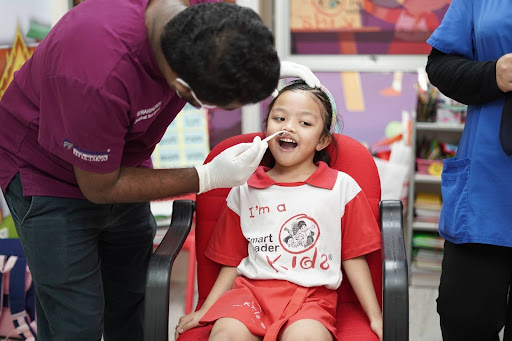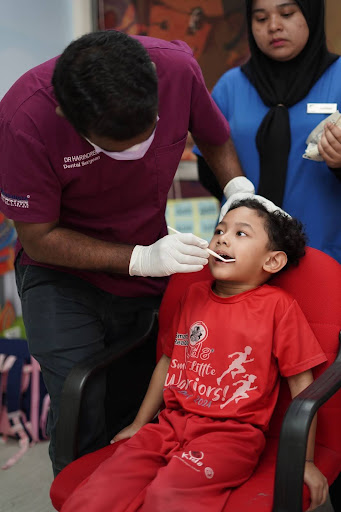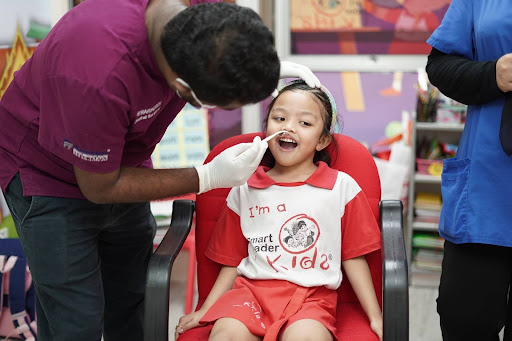
From the moment that first tiny tooth appears, your children’s smile begins an important journey. Those little pearly whites may be temporary, but they play a big role in your children’s overall health and development. Establishing good dental habits early on not only ensures healthy teeth today but lays the foundation for cavity-free smiles. Wondering how to help your children build those habits?
Here are some simple, effective tips on how to take care of your children’s teeth and make dental care a fun part of their everyday routine!
How to choose the right toothbrush?
With so many toothbrushes available in the market, finding the right one for your child can feel overwhelming. However, a few key considerations can make the decision easier. Since children have smaller mouths, it’s important to choose a toothbrush that fits their mouths comfortably. Opt for a brush with a small head and soft bristles. These are gentle on young gums and help encourage a positive brushing experience.
How do I guide my children to brush their teeth?
Teaching your child to brush their teeth can take time and patience, but with consistent guidance, they will soon be able to do it on their own. In the early stages, it’s important to continue brushing their teeth for them until you’re confident they have developed the right technique. You can guide their hand during brushing to help them learn the correct motions and build muscle memory.
Using a mirror can also be helpful, as it allows your children to see exactly where the toothbrush is cleaning. Since some children may find brushing unpleasant or boring, try turning it into a fun and interactive experience. Singing songs, using colourful toothbrushes, or turning it into a game can make brushing something they look forward to each day.
What is the correct amount of toothpaste that should be used?
Using fluoridated toothpaste is an effective way to prevent tooth decay and cavities. For children aged 3 to 6, it’s recommended to use only a pea-sized amount. This small amount provides enough fluoride to protect their teeth without the risk of overexposure.
Here are some important tips to keep in mind:
- Supervise brushing to ensure your children don’t eat or lick the toothpaste.
- Teach them to spit out the toothpaste after brushing.
- Avoid rinsing with water immediately after brushing, as this can wash away the fluoride before it has a chance to work effectively.
Why sugary drinks or snacks are not good for your children’s teeth?
Processed sugars can be harmful to your child’s teeth, especially when proper brushing isn’t practiced. Sugary foods can get stuck between the teeth, leading to plaque buildup and eventually, cavities. Over time, this can cause significant damage and leave your child with painful dental problems.
It’s important to teach children the difference between healthy and unhealthy snacks. Helping them make informed choices early on encourages good eating habits and raises awareness about the consequences of consuming too many sugary treats and drinks. A balanced diet, combined with proper oral hygiene, is key to maintaining strong and healthy teeth.
When do I bring my children to the dentist?

It’s recommended to bring your child for their first dental visit around their first birthday, or within six months after their first tooth appears. During this visit, the dentist can examine your child’s teeth, identify any early concerns, and provide guidance for proper oral care moving forward.
For many children, visiting the dentist can be a daunting experience. As a parent, you can help make the visit more enjoyable and less intimidating. Here are some helpful tips to ease dental anxiety:
- Bring along your children’s favourite toy or blanket for comfort.
- Choose a dental clinic or dentist who specialises in working with children.
- Offer plenty of reassurance and stay by their side to provide emotional support.
Establishing good oral hygiene habits from an early age is one of the best gifts you can give your child. From choosing the right toothbrush to making brushing fun, limiting sugary snacks, and ensuring regular dental check-ups, every small effort contributes to a healthier, brighter smile. With your guidance and encouragement, your child will build strong habits that support their dental health for life.

